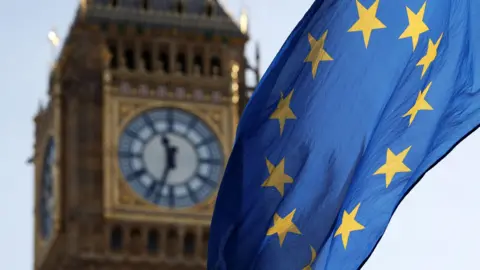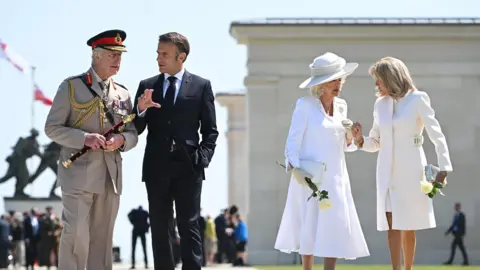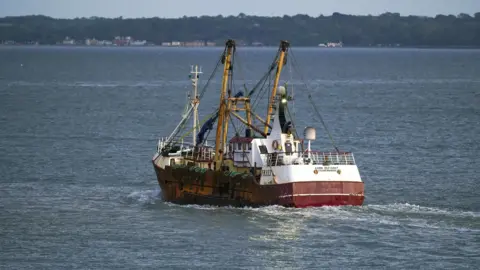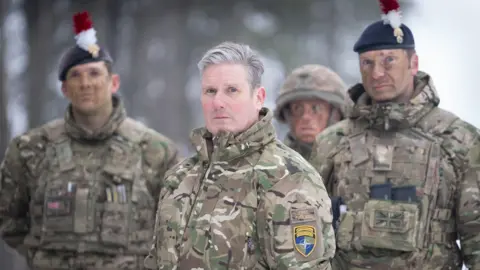Defence deals and palace invites: UK and EU haggle before first summit since Brexit
 EPA-EFE/REX/Shutterstock
EPA-EFE/REX/Shutterstock"Don't expect miracles. But do know - everyone wants this to work."
On Monday in London the EU and UK hold their first bilateral summit since Brexit. Symbolically, this is a big moment.
Officials and analysts I speak to, on and off the record, like the individual I just quoted, are quick to point out difficulties that exist between the two sides.
But all acknowledge the bilateral bitterness provoked by Brexit is no more. It's been eviscerated by the gravity of global events.
Concerns about Russia and China, the war in Ukraine, the shock of the US under Donald Trump no longer prioritising European defence, plus a growing sense of voter insecurity is propelling the two powers to work closer together.
"Failure to do so, in the current international context, would not be a good look," says Anand Menon, director of the think tank UK in a Changing Europe.
Most European countries realise that, he adds: "Even the French."
More than most EU countries, France has been playing hardball in pre-summit negotiations.
Is it a coincidence that as talks went to the wire before Monday's summit, the UK announced that France's president has been invited for his first state visit?
King Charles and Queen Camilla will host Emmanuel Macron and his wife at Windsor Castle in July. A UK attempt to butter up the French leader, perhaps?
"It'll be interesting to see if they can agree common language [for a summit agreement]," says Georgina Wright, Senior Fellow at the German Marshall Fund.
"Everyone in the EU wants closer relations with the UK right now and France doesn't want to be seen as the one country blocking closer UK-EU cooperation. But that does not mean that Paris is willing to give up on core interests."
Interests like fishing rights in UK waters and bidding for EU defence contracts.
 The Telegraph/PA
The Telegraph/PANegotiating - or to be more accurate - haggling over the "meat" of the summit will, I'm told, continue till the last moment.
On the day itself, we can expect three separate announcements:
- A joint declaration that addresses the worrying geopolitical situation and emphasises UK-EU shared foreign policy priorities - such as supporting Ukraine, keeping up pressure on Russia, and ending civilian suffering in Gaza
- An EU-UK security and defence pact
- A package of measures targeted at removing some trade barriers between the EU and UK that have come about because of Brexit
Closer economic ties to Europe
These trade measures are the "reset" of relations with the EU that UK Prime Minister Sir Keir Starmer has promised since his party won a general election last summer.
They are far from an economic gamechanger for the UK, though. Hardly what you'd call ambitious.
Destroying all trade barriers with the EU is impossible if the Labour government keeps to its own "red lines" of not rejoining the bloc's customs union or single market.
Despite promising to prioritise UK economic growth, and polls suggesting the majority of Britons want to do more trade with the EU, Labour will feel hemmed in by the increasingly popular, Eurosceptic Reform Party.
It performed well in recent local elections in the UK.
While some in Labour (quietly) admit they are tempted by a customs union with the EU to boost growth, any economic benefits would likely not be apparent to voters before the next UK election.
Party members fear they would risk being punished at the polls, amidst accusations by the opposition Conservatives and Reform that the government would have betrayed Brexit.
These concerns make the Starmer government "more cautious, less bold", says Mr Menon.
So what will be agreed at the summit?
The UK is taking a sector-by-sector approach to try to reduce costly trade barriers with the EU.
Many EU-UK negotiating hours have gone into agreeing a plant and animal health deal, known as an SPS agreement.
This will facilitate the export and import of meat and plant products between the EU and UK and help reduce post-Brexit trade complications between Northern Ireland and Britain.
In exchange, the EU insists the UK must agree to following any new SPS rules introduced in the future and accept a role for the European Court of Justice in policing the agreement.
Those conditions will likely be unpopular with ardent Brexit supporters.
They might also put backs up in Washington and complicate the UK doing a wider future deal on agriculture with the US, as the UK would be tied to stringent EU standards.
 PA
PABut the Labour government knows public opinion polls suggest most people in the UK prioritise trade with the EU over the US.
Currently the EU counts for 41% of UK exports; the US for 21%.
The UK government will probably insist the SPS agreement is good for the British economy. Though animal and plant exports and imports are, in fact, a small part of overall GDP.
In reality "growth is a bit of a red herring here", says Mr Menon.
On the EU side, the French, backed by other fishing nations like the Netherlands and Denmark, have taken a tough stance in these talks - refusing to sign up unless the UK agrees to long-term EU fishing rights in UK waters.
The current post-Brexit fishing agreement expires next year.
Free-er movement for some
The reset we'll hear about at Monday's summit will also include a "mobility" section.
Starmer will get his ask, for the EU to recognise UK professional qualifications, to encourage cross-border business.
There will also be a reduction in visa restrictions for UK musicians travelling and performing in the EU.
In exchange, the EU - and Germany, most passionately - wants a youth mobility scheme, allowing young EU citizens to travel, study, and even work in the UK.
The UK has similar schemes with Canada, Australia, South Korea and Japan, amongst others. But this has been tricky to agree.
Reducing migration figures is a number one priority for the Labour government.
It's a hot-button issue and the UK Home Office will seek to toughen conditions and limit EU numbers.
Negotiations are ongoing but, according to EU sources, the scheme already has a name: YES, or Youth Experience Scheme.
Some areas of negotiation are more advanced than others. This will be reflected in Monday's announcement.
There will also be talk at the summit of plans to tackle illegal migration, cooperate on carbon border taxes, and simplify energy trading between the EU and UK.
Reducing EU-UK trade barriers on chemicals and pharmaceutical goods is also a UK ambition, as is getting access to EU databases, like the Schengen Information System, to better track down criminals.
But for now, at least, the EU is saying no to that. If it makes an exception for the UK, other non-EU countries will demand the same, it insists.
Of course, it's in the interest of both sides to fight cross-border crime. The UK argues the current state of the world calls for more flexible thinking from Brussels.
Defence and security complications
The case for more flexible thinking is also something the UK is calling for when it comes to Monday's defence and security pact with the EU.
The EU and UK already work closely together on Russian sanctions and defending Ukraine. And the pact isn't a legally binding document, so how complicated can these talks be, you may ask?
The answer is pretty complicated.
The UK wants its defence companies to be allowed to bid for contracts under the EU's new re-armament scheme, SAFE (Security Action for Europe).
"The UK has earned the right to access such a deal because of the leadership it's shown over Ukraine," says international defence expert Sophia Gaston, a visiting fellow at King's College London.
 PA
PA"Britain is a serious player both in traditional defence capabilities, like producing munitions, and in cutting edge defence innovation, where new growth and energy is.
"If the UK has access to the emerging EU defence programmes, it can contribute to mass and pace. [The war in Ukraine] has shown that both are needed."
But Ms Gaston admits, UK companies getting the go-ahead from Brussels is a "messy" process.
"Re-Arm EU", as Brussels dubs its new drive, is still a work in progress, spurred by rapidly changing geopolitics, including fears the US will withdraw at least some of the crucial security support Europe has relied on since World War Two.
This is not yet a fully formed EU strategy that the UK can "pay to play" a part in, as it has done post-Brexit with the EU's research and innovation scheme Horizon, for example.
An agreement with the UK in this defence industrial context will be brand new and bespoke. And it's getting political.
Signing the security pact on Monday is just a step in the process.
France wants to severely restrict non-EU companies bidding for the bloc's defence contracts, including the UK but Canadian and American firms too.
If the EU is spending its taxpayers' money on defence, it argues it should be spent with EU companies to help boost EU economies.
Paris also says, in this rapidly changing world of shifting alliances and allegiances, the EU should be self-reliant, not dependent on suppliers outside the bloc.
Sceptics suspect France, which has a sophisticated defence industry, of wanting to hoover up lucrative EU contracts for itself.
But it looks like it is losing the internal EU argument, with the Nordics, the Baltics, Poland, Italy and the Netherlands favouring more openness on defence contracts, and particularly with the EU's biggest economic power, Germany, championing the UK.
"Germany and France have very different attitudes towards the UK," says German economist Armin Steinbach from think tank Bruegel.
Germany will always put relations with EU heavyweights France and Poland first, says Mr Steinbach.
But he believes the UK will be helped in defence and economic negotiations with the EU by new German Chancellor Friedrich Merz, who argues "a unified Europe is the absolute priority in the current geopolitical setting".
Huge challenge of defence cooperation
A priority maybe, but it's still a hugely tall order because it's all about compromise.
Political leaders will seek to justify increases in defence spending by insisting to voters that it's for their personal security and in the interest of their national economy, with boosts in revenue for domestic defence industries.
But achieving a pan-European industrial base - built to be efficient, avoid duplication, and to replace much of the US capacity relied on by the continent today - would mean some European countries winning more defence contracts than others.
It would also mean some national businesses shutting down, in favour of better-suited ones elsewhere on the continent.
That's a hard sell for political leaders facing their voters.
As is another big trade-off: Big increases in defence spending will mean governments have less money to spend on public services.
The challenge for Europe is breathtaking. By comparison, Monday's symbolic EU-UK summit, may seem like a walk in the park.
